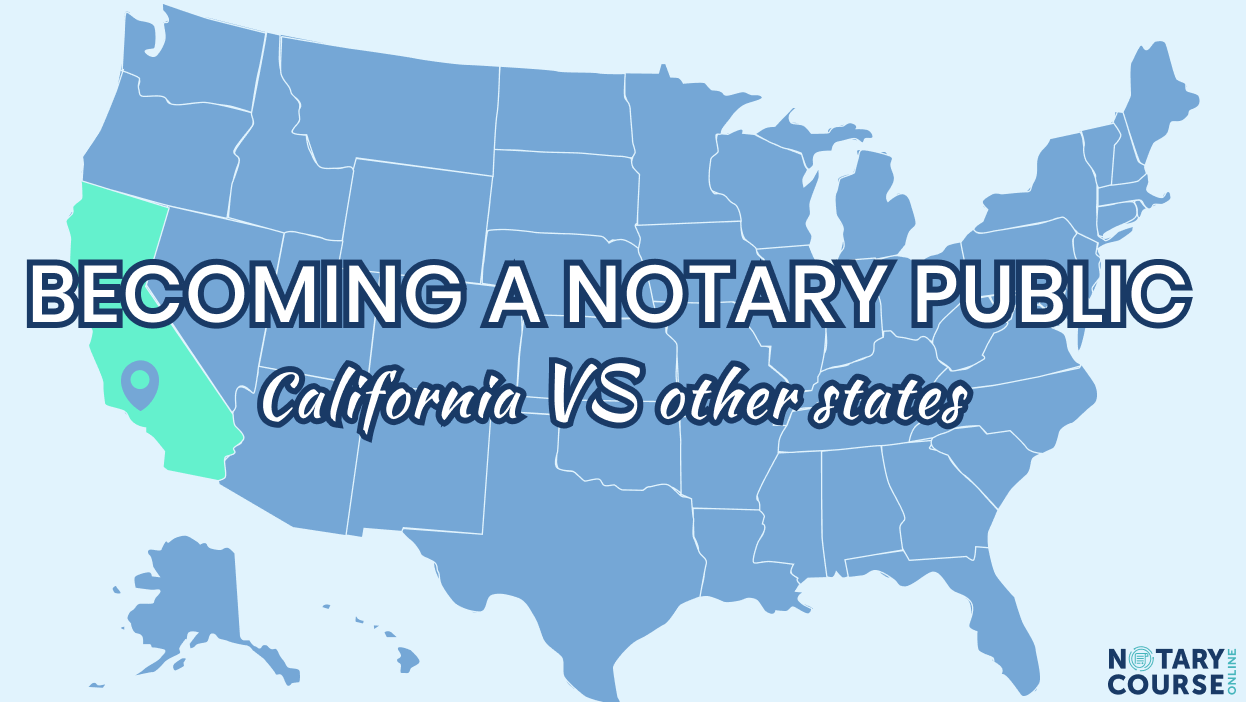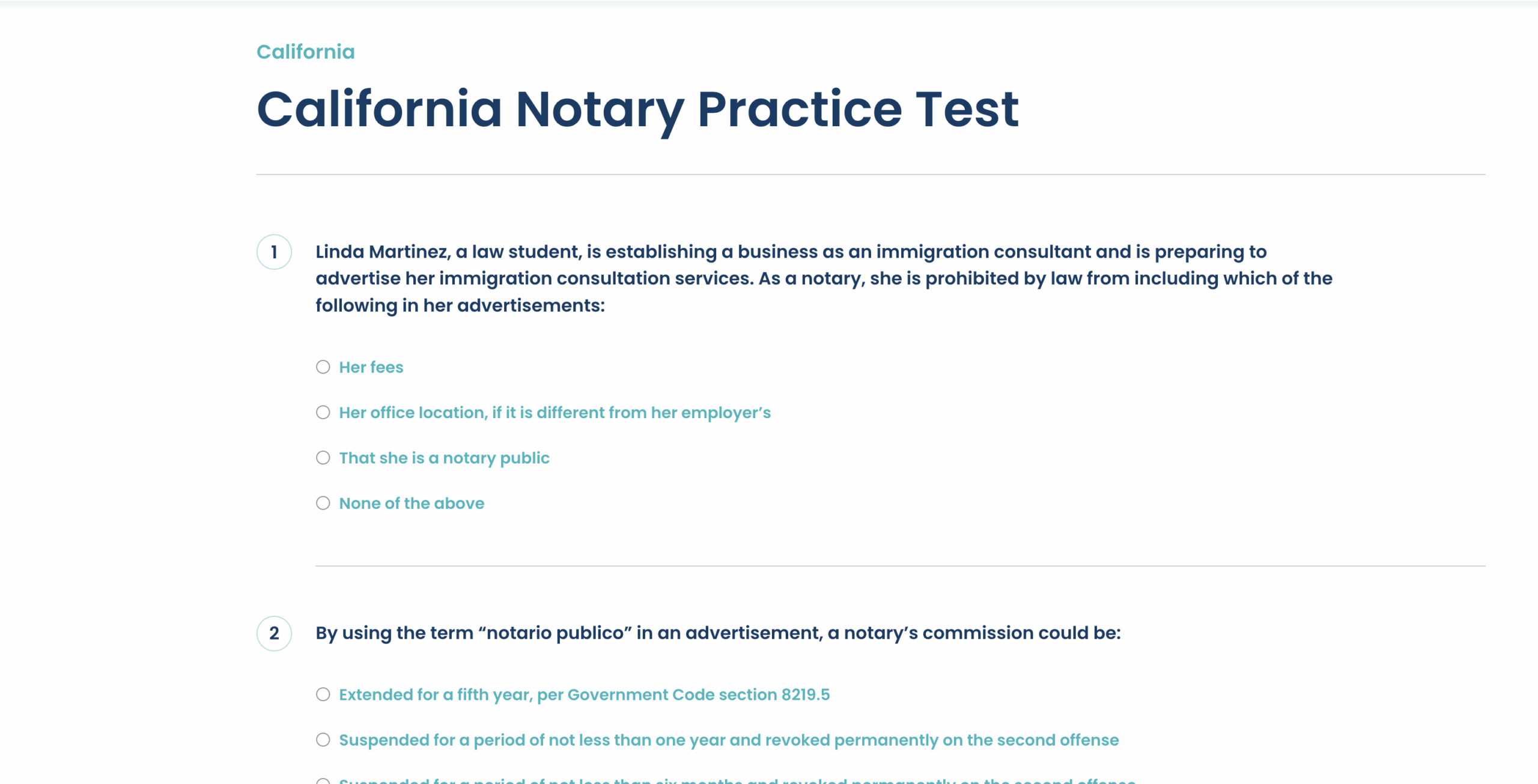California
Blog
How much does it cost to become a notary in California?

-
by Notary Course Online
- November 14, 2024
Introduction
Becoming a notary public in California is a rewarding role that involves witnessing the signing of important documents, administering oaths, and helping deter fraud. As a California notary public, you’ll play a vital part in legal and business transactions.
Understanding the costs involved in this career path is crucial. The cost to become a notary in California can vary significantly due to factors like location, the quality of supplies, and the training course provider. Awareness of these expenses ensures you make informed decisions throughout the process.
In this article, we will explore how much it costs to become a notary in California. You’ll find detailed insights into the various expenses you need to consider when pursuing this career. Whether you’re looking at training fees, application costs, or necessary supplies, we’ve got you covered.
If you’re interested in becoming a notary public, you can follow these 7 steps to get started. And if you’re wondering about finding a notary near you, resources are available online to help with that too here.
Understanding Notary Public Requirements and Costs in California
Eligibility Requirements
Becoming a notary public in California involves meeting specific eligibility criteria set by the state. The primary requirements include:
- Age: You must be at least 18 years old.
- Residency: Residency within the state of California is mandatory. This ensures you are familiar with local laws and regulations.
- Background Check: A thorough background check is conducted to ensure the integrity and reliability of potential notaries. This involves reviewing your criminal history.
These prerequisites ensure that only qualified individuals are entrusted with the responsibilities accorded to a notary public.
Application Process
The path to becoming a notary begins with an application to the California Secretary of State. The application process involves several steps:
- Application Fee: A non-refundable fee of $40 is required when submitting your application.
- Passport Photo: Submission of a passport-style photo is part of the application process, which typically costs around $15 at drugstores such as Walgreens, CVS, or Rite Aid.
These steps are crucial in setting up your profile as a prospective notary.
Examination Requirements
To further qualify, aspiring notaries must pass an examination that assesses their understanding of notarial duties and responsibilities:
- Notary Public Exam Fee: The exam is part of the application process and you will pay the fee of $40 at the exam site. This fee covers the costs associated with administering and grading the exam.
- Content: The examination tests knowledge on various aspects of notarial practice, including legal guidelines and ethical standards.
It’s essential to prepare thoroughly for this exam as it forms a critical component of achieving your commission.
Resources for Aspiring Notaries
Understanding these requirements and associated costs is vital as they lay the foundation for your journey in becoming a certified notary public in California. Each step, from meeting eligibility criteria to passing the examination, incurs specific fees that contribute to the overall cost of this professional pursuit.
For those seeking more information about notary public services in California, or looking for tips and advice, there are numerous resources available online. Websites like Notary Course Online offer valuable insights through their blog featuring news, tips & articles related to the notary profession.
Additionally, they provide a variety of notary supplies essential for performing notarial duties effectively. For those who prefer structured learning, exploring their courses can be beneficial in gaining comprehensive knowledge about becoming a successful notary public.
Lastly, remember to stay steady-ready during your preparation process.
Training Costs for Aspiring Notaries in California
When pursuing a career as a notary public in California, one crucial step is completing a notary training course. Training options fall into two main categories:
1. Online Notary Training Courses
- Flexible and convenient, allowing you to study at your own pace.
- Generally more affordable with course costs around $40.
- Ideal for those who prefer learning from the comfort of their home.
- Many online courses also provide valuable resources such as practice tests to help you prepare.
2. In-Person Notary Training Courses
- Often provide hands-on experience and direct interaction with instructors.
- Costs can be significantly higher due to additional expenses like venue rentals, sometimes reaching several hundred dollars.
- Suitable for individuals who benefit from face-to-face learning environments.
Choosing between these options depends on personal preferences and budget constraints. Online courses offer affordability and flexibility, while in-person sessions may deliver a more interactive educational experience, albeit at a higher price point. The decision ultimately hinges on your learning style and financial considerations when evaluating notary training course costs.
It’s also essential to understand some practical aspects of being a notary in California. For instance, you might wonder if you can notarize for a family member, or what challenges mobile notaries come up against. Furthermore, being aware of the California Secretary of State’s disciplinary actions guidelines for notaries public can help you maintain your professional standing.
Exam, Background Check, and Live Scan Fingerprinting Fees for Notaries in California
Becoming a notary public in California involves fulfilling several requirements, including passing an exam and undergoing a background check. Here’s what you need to know about these fees:
1. Notary Exam Fee
You must pass a state-mandated notary exam, which included in the application fee a fee of $40. This exam evaluates your understanding of the legal responsibilities and duties of a notary public in California.
2. Live Scan Fingerprinting Costs
To facilitate the background check, a live scan fingerprinting is necessary. The fees for this service vary significantly based on location and provider:
- Local police stations may charge as low as $10
- Private providers can demand up to $50
- On average, expect to pay around $30
3. Background Check Fees for Notaries
An essential part of the process is a comprehensive background check. The cost for this check is $49, ensuring that you meet the ethical standards required to serve as a notary.
These costs are crucial considerations when calculating how much it will cost to become a notary in California. Each step is designed to ensure that only qualified individuals receive their commission, maintaining the integrity of the notarial profession across the state.
Surety Bond, Insurance, and Supplies Costs for Notaries in California
Understanding the financial commitments involved in becoming a notary public in California includes grasping the importance of a surety bond and optional insurance. A surety bond requirement in the amount of $15,000 of coverage for notaries is mandated by the state, with costs typically around $38. This bond serves as a protective measure for the public against any potential errors or misconduct by the notary. It does not shield the notary themselves; rather, it provides financial recourse to those who might suffer losses due to a notary’s mistake.
Considering personal protection, many notaries choose to invest in errors and omissions insurance. Although it is not required by law in California, it offers an additional layer of security for the notary against claims of negligence or mistakes made during notarization. This insurance varies significantly in cost, ranging from $40 to $170, depending on the coverage amount and provider chosen.
Equipping yourself with essential supplies is another crucial step after receiving your commission. The necessary supplies include:
- Notarial Journal: Maintaining a record of all notarizations is vital for legal compliance and accountability. The cost for a journal typically hovers around $15.
- Stamp and Seal: These are indispensable tools for authenticating documents. Prices can vary based on quality and vendor but generally range from $15 to $35.
Each of these components plays a pivotal role in ensuring that you are prepared to undertake your duties effectively and responsibly. Investing wisely in insurance and quality supplies can mitigate risks while enhancing your professional credibility. As you budget for your new role as a notary, these elements should be factored into your total expenditure calculation. Understanding these costs helps prepare you thoroughly, ensuring a smooth transition into your new professional responsibilities.
Total Estimated Cost to Become a Notary in California
The total cost for becoming a notary in California involves several key expenses that aspiring notaries need to consider:
Expense Cost
Application & Exam Fee: $40
Passport Photo: $15
Training Courses: Approximately $40, though costs can vary significantly based on the provider and format (online vs. in-person)
Live Scan Fingerprinting: Typically around $30, with fees ranging from $10 to $50
Background Check Fee: $49
Surety Bond Requirement: $38
Optional Errors and Omissions Insurance: Ranging from $40 to $170
Stamp and Seal: Between $25 and $30
Notarial Journal: Approximately $25
These costs collectively shape the financial landscape for aspiring notaries. Several factors influence these expenses:
- The choice of training provider impacts the cost significantly, as does the decision between online courses and more expensive in-person options.
- Location also plays a role, particularly concerning live scan fingerprinting fees which can fluctuate widely.
- The quality of supplies chosen can further affect the total expenditure. Opting for higher-end supplies or additional insurance can add to the initial outlay, aligning with personal preferences or professional requirements.
Understanding these variables aids in making informed decisions about becoming a notary in California.
Conclusion
To become a California notary public, you need to understand the costs involved. This includes application fees, training expenses, and supplies. By knowing how much it costs to become a notary in California, you can plan effectively.
Approach each step of the process with confidence and carefulness. Make sure you are fully prepared for this professional journey. Investing in high-quality training and dependable supplies will establish a solid foundation for your notary career.
Take informed actions towards certification, using the knowledge and resources that will help you navigate the process smoothly and efficiently.
FAQs (Frequently Asked Questions)
What are the eligibility requirements to become a notary public in California?
To become a notary public in California, you must meet certain eligibility requirements including being at least 18 years old, a resident of California, and passing a background check.
What training options are available for aspiring notaries in California?
Aspiring notaries can choose between online and in-person training courses. The estimated cost for these training courses typically ranges around $40.
What fees are associated with the notary exam and background check?
The fees for taking the notary exam are included in the application fee of $40, while the live scan fingerprinting fees can vary $10 to $50, with an average cost around $30 and the background check costs approximately $49.
Is errors and omissions insurance mandatory for notaries in California?
Errors and omissions insurance is optional for notaries in California. However, it is recommended for protection against potential claims. The costs for this insurance can range from $40 to $170.
What supplies do I need to purchase as a new notary public?
As a new notary public, you will need essential supplies including a stamp, journal, and seal. The expected costs associated with these items include maintaining a notarial journal (approximately $15) and stamp/seal costs ranging from $15 to $35.






 Congratulations!
Congratulations!